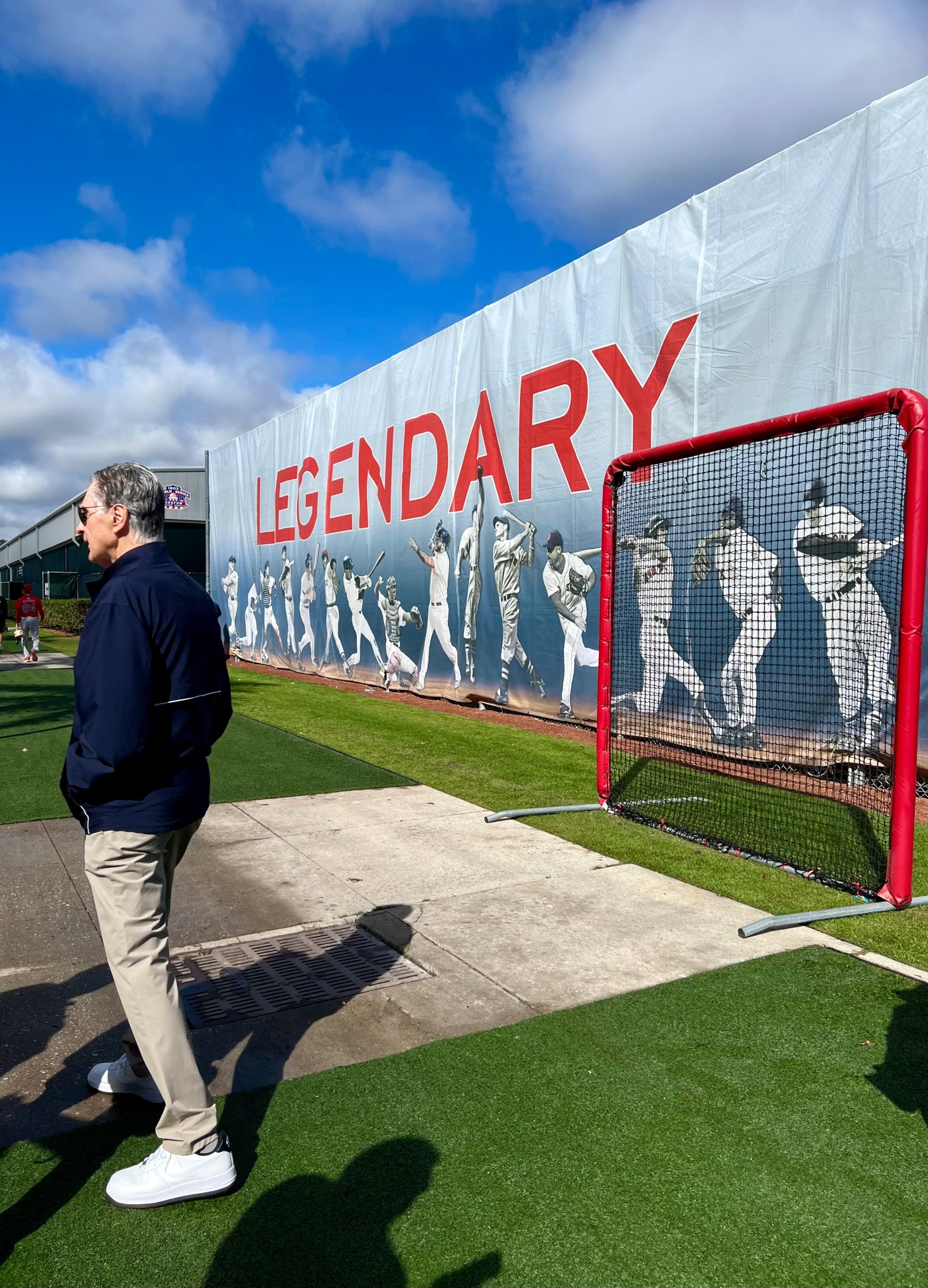
‘Find your identity’: Alex Cora’s directive more fitting for Red Sox ownership than players
FORT MYERS, Fla. – “Remember who we are.”
Addressing the entire 2024 Red Sox for the first time on Monday, Alex Cora touched on many topics: goals, conflicts, success, failure, comparisons, identity.
If his recap for the media was any indication, the speech was full of messages for his players, as well as several that sounded more fitting for ownership; principal owner John Henry, chairman Tom Werner, and CEO Sam Kennedy were in attendance for the annual spring training kickoff.
“You’re always looking for a North Star, whatever,” the manager said. “Sometimes, doing that, you forget who you are. Remember who we are. Let’s not forget that. I don’t care what people think, two last-place finishes, all that. We’re really good at what we do, and we gotta get back to that.”
(By the way, Sam Kennedy proclaimed that championships were still their “North Star” at the end of last season.)
“Just gotta find your identity, that’s the most important thing,” declared the Sox skipper. “Whatever we have gone through the last two years, (we’re) still the Boston Red Sox.”
Technically, yes, of course, they are still the Boston Red Sox. Same team name, same ballpark, same city, some of the same players. Yet the first and second halves of the above directive are somewhat contradictory. If they were “still” the Sox, they wouldn’t exactly need to be on a quest to discover their identity, right?
To say that any team is “still” itself is something of an impossible idea. Are these still Babe Ruth’s Red Sox? Ted Williams’? David Ortiz’s? Are they the Red Sox who didn’t win a World Series for 86 years? The Red Sox who won four World Series in 15 years? The Red Sox who traded Mookie Betts? The Red Sox who’ve finished last in three of the past four seasons?
They’re all of those things combined. They’re also none of them anymore. That’s why identity can be so tricky and difficult for a sports team to define, especially one entering its 124th season. Each year may be a clean slate, but the baggage is heavy and they have no choice but to carry it. There are things they can never get back, and things ahead that are beyond their control. Change is the only constant.
So, the Red Sox can talk about turning the page all they want (and they do.) But doing so is another animal, and doesn’t change what’s already been written. Especially when one’s fan base has a long and encyclopedic memory.
Almost everyone remembers who the Red Sox are supposed to be. Who they were for much of this century. They were the big spenders, swinging erratically from last to first and back again like Tarzan on the vine, but almost always in win-now mode. They were the “Cowboy up!” crew, The Idiots, the Dirt Dogs, the ‘Chicken and Beer’ disasters, the “Fear the Beard” and “Boston Strong” heroes, and the dominating “Damage Done” squad.” They were lovable, infuriating, heroic, unacceptable, a dream come true, and a nightmare. Often, all within a single season. Sometimes, within the span of nine innings.
If anyone’s forgotten who the Red Sox are and who they’re supposed to be, it’s the people who made them this juggernaut in the first place: their owners. Once upon a time, they spent and spent and spent, first to save Fenway Park from ruin and gaudy replacement and to reverse the curse, then to make sure they weren’t an October one-hit wonder, and so on and so forth. In short, they were a dream come true for a fan base that had spent nearly nine decades being shown that their dreams would never come true.
But over the last half-decade, they’ve dismantled the very dynasty they’d built. Ownership is rarely available or even present, a stark contrast to the good ol’ days.
“Win a World Series? That’s not my choice, it’s my role, it’s my obligation,” Henry told the Boston Globe in 2004. “I certainly identify with the fans, because I’ve been one my entire life.”
On Monday, when asked if he had a couple of minutes to field questions from the media, something he hasn’t done since the Betts trade four years ago this month, he chuckled, said no, and walked away.
As the Red Sox rebuild for what they claim will be consistent contention someday, they’ve plummeted from the top of the spending pyramid, and conducted business in ways many around the industry don’t understand. Kennedy confirmed on Monday that ownership set a spending limit for the offseason. At Winter Weekend, he said that this year’s payroll would probably be lower than the last.
Spending is no guarantee of success. But not spending, especially when there’s the ability to do so and a legitimate chance of improvement, hasn’t yielded success, either. Nor are the optics of charging premium prices for a subpar product flattering.
“We get criticized, like every other organization,” Cora said. “Remember who you are. It doesn’t have to do with free agents, or player development, or if you’re No. 1 in Baseball America. If you look at the body of work the last 20 years, we’ve been very successful. I don’t care what people think, there’s four rings to show it.”
Cora can speak with such confidence because he won rings as a player and as their manager. The Red Sox earned the right to brag through hard work, grit, determination, blood, sweat, tears, and a lot of money spent. The Red Sox are the winningest team of the millennium, and their nine championships overall make them tied for the third-winningest franchise in MLB history.
Does that mean they’ve done enough? Most fans around the league would say yes, let others have their turn. Which is fair, especially for the folks in Cleveland, who haven’t won a World Series since 1948. There are teams that have never won.
But the expectations are different in Boston than, say, Tampa Bay and Oakland. They’re different because this ownership made them so. No more going all the way to Game 7 just to have Enos Slaughter/Bill Buckner/Aaron Boone dash those hopes once again.
“Not everyone can be the Dodgers that (have) been in the playoffs I don’t know how many years in a row,” Cora said. “That’s cool, that’s great, but when you’re in the dance, you gotta win it, and we’ve been in the dance a few times and we won it.”
Yes, they have. And is it fair to give the locals a taste of glory and then decide that’s enough for them to live on? Are fans greedy – perhaps – or are they simply holding this team to the very standard they were taught to expect from them? Because Red Sox fans certainly had no expectations by Year 86 of wandering in the desert.
“I think sometimes, trying to emulate other organizations, you deviate from who you are,” added Cora. “Hopefully, we can get back to who we are, and other organizations are like, we want to be like them.”
All told, it sounded like a stirring oration, the spontaneous kind that could rally troops to do what no one thinks they can. “It was good,” Chris Martin told the Herald. “We needed that.”
Cora said that wasn’t how he intended it, though. “Been thinking about this for a while.”
That’s to be expected, as he enters the final year of his contract to manage the team. If he’s ready to leave, or he expects that he won’t be asked to return, why not tell the Red Sox to stop trying to be Tampa Bay North?
Perhaps it will rally the troops, all the same. There’s a lot of hunger, competition, and shoulders with chips in them in this Red Sox clubhouse. You never know.
This iteration of the Red Sox will carve out their own identity.
It’s ownership who owe it to fans to rediscover theirs.


